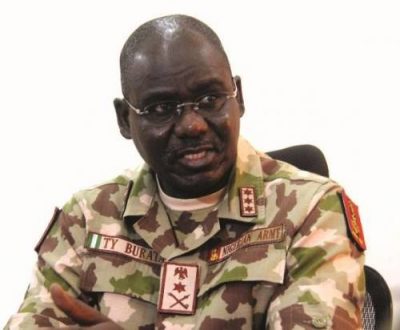Army Chief Buratai Tackles Danjuma At Burial Of 11 Soldiers Killed In Kaduna
Eleven soldiers of the Nigerian Army killed in an ambush attack by bandits at Birnin Gwari area of Kaduna State on March 20 were buried at a very solemn occasion on Thursday.
The soldiers, identified as Bamidele Adekunle, Christian Oguchukwu, Adam Muhammad, Sulaiman Mubarak, Bashir Sani, Usman Abubakar, Nafi’u Iliyasu, Safiyanu Ahmad, Alhassan Ibrahim, Abegunde Emmanuel, and Hammed Olubode who were on operation `Ayem Akpatuma’, a special military operation against herdsmen and other bandits when they were killed were laid to rest at the Commonwealth Cemetery.
The soldiers, who were all privates got enlisted into the army in 2017, with the exception of Hammed Olubode who was enlisted in 2015.
Lt.-Gen Tukur Buratai, Chief of Army Staff, who was represented at the burial ceremony by Maj.-Gen. Muhammad Muhammad, General Officer Commanding (GOC), 1 Division, lamented that the young soldiers paid the supreme price barely a year after committing themselves to serve the country.
He said, “As we speak, most of them have not gone back to their relations to say, ‘this is the uniform I joined.’ That is the sadness of this occasion, now they have paid the supreme sacrifice in the defence of the territorial integrity of this country.”
He said that the deceased soldiers laid down their lives defending the nation from armed bandits and questioned those doubting the loyalty of the military to the nation.
“How then can we tell them that they are aiding those who killed them, that today they have paid with their lives to aid those who killed them? If we are responsible enough to make a statement, we should not generalize,” he queried in obvious reply to General Theophilious Danjuma, a former Chief of Army staff who said at an event in Taraba last week that Nigerian troops are giving cover to bandits to kill their countrymen.
Buratai however vowed that those who killed the soldiers will account for their crime: “Their blood will not be shed in vain; we, their colleagues, who are still alive will continue where they stopped; their memory will still be with us. We find ourselves as first respondents, we will not shy away from it and we will continue to do our duties diligently regardless of any shortcoming.” (SaharaReporters )


